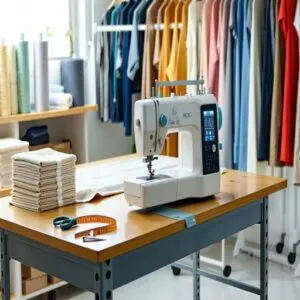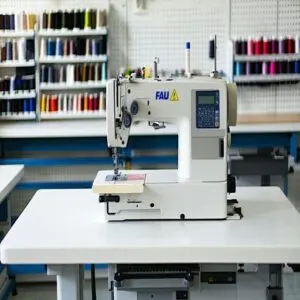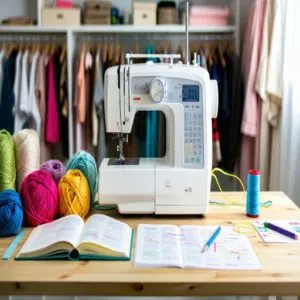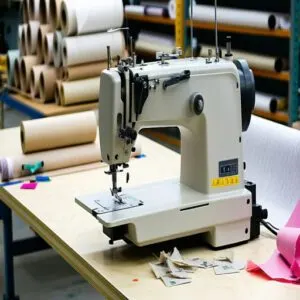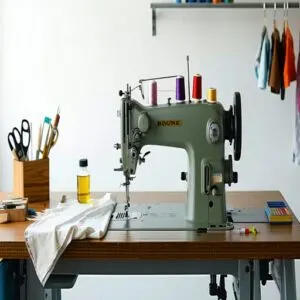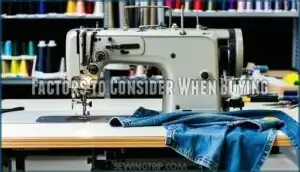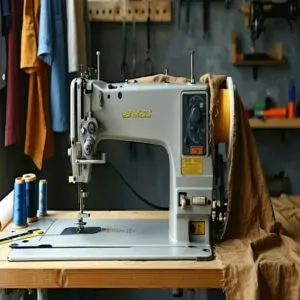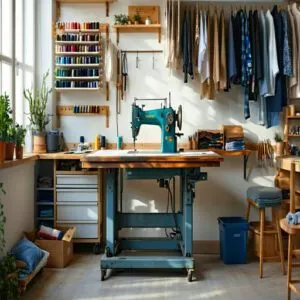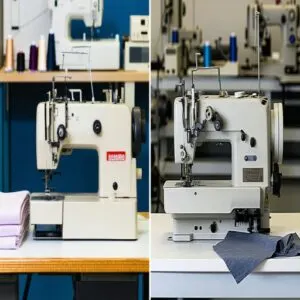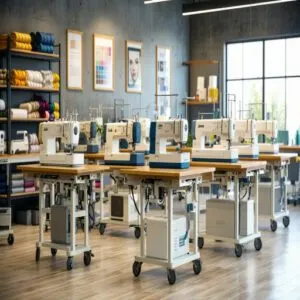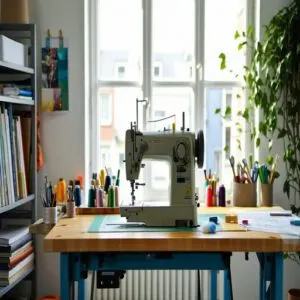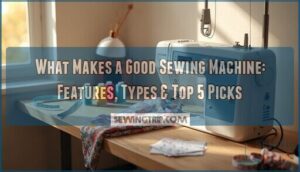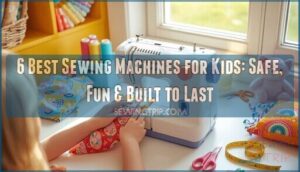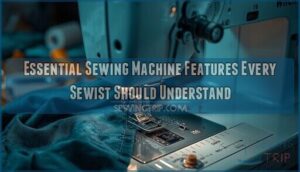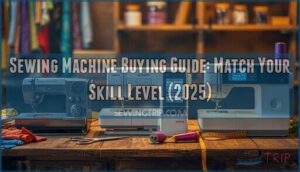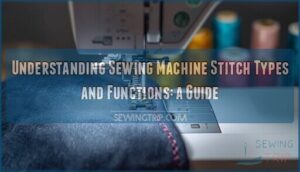This site is supported by our readers. We may earn a commission, at no cost to you, if you purchase through links.
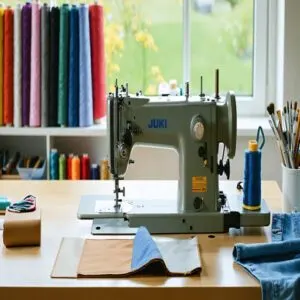
Brands like Juki and Janome lead the pack with reliable options that handle heavier fabrics, faster speeds, and demanding projects.
Need to stitch leather wallets or whip up small batches of clothing? These machines have you covered. Models range from $800 to $2,500, so budget carefully and look for features like motor power, stitch quality, and noise levels.
With the right choice, you’ll be armed for both precision and productivity—plus a few sewing adventures.
Table Of Contents
- Key Takeaways
- Semi Industrial Sewing Machines
- Choosing Right Semi Industrial Machine
- Top 9 Semi Industrial Sewing Machines
- 1. Juki industrial straight stitch sewing machine
- 2. Juki sewing and quilting machine
- 3. Janome 1600P QC High Speed Quilting Machine
- 4. Juki industrial sewing machine servo
- 5. Juki Industrial Overlock Sewing Machine
- 6. Juki portable sewing machine for quilting
- 7. Juki computerized sewing machine model
- 8. Industrial Grade Serger Sewing Machine
- 9. Heavy Duty Industrial Sewing Machine
- Semi Industrial Machine Maintenance
- Factors to Consider When Buying
- Semi Industrial Vs Industrial Machines
- Sewing Machine Brands and Models
- Buying Guide and Recommendations
- Frequently Asked Questions (FAQs)
- Conclusion
Key Takeaways
- You’ll get the durability and efficiency of industrial models in a compact, budget-friendly design, perfect for home or small business use.
- Look for key features like motor power, stitch quality, and adjustable settings to handle tougher fabrics and demanding projects effortlessly.
- Semi-industrial machines strike a balance between power and ease of use, making them ideal for small-batch production or heavy-duty sewing tasks.
- Investing in proper maintenance and workspace setup ensures your machine delivers consistent performance and lasts longer.
Semi Industrial Sewing Machines
You’ll find that semi-industrial sewing machines offer the perfect balance between household models and full industrial units, giving you professional-grade features without the hefty price tag or space requirements.
These versatile machines can handle thicker materials and longer sewing sessions than regular domestic machines, making them ideal for small businesses and serious hobbyists who need reliable performance.
They are particularly suited for individuals who require a machine that can handle demanding tasks, providing professional-grade features without the significant investment of a full industrial unit.
Definition and Purpose
When you’re ready to step up your sewing game, a semi industrial sewing machine stands as your perfect middle-ground solution.
These powerhouse machines bridge the gap between standard home devices and full industrial equipment, offering enhanced stitch quality and fabric handling capabilities.
You’ll find they pack professional-grade features while maintaining a more compact, approachable design that won’t overwhelm your workspace.
They’re ideal for tasks that require heavy duty sewing capabilities, making them suitable for a variety of projects.
Benefits for Businesses
Your investment in semi industrial sewing machines can transform your business operations.
These commercial sewing machines deliver remarkable benefits that boost your bottom line:
- Enhanced Efficiency: Handle substantial daily sewing requirements at higher speeds, letting you complete more projects in less time
- Business Growth: Create professional-quality products while maintaining a manageable size and cost
- Cost Savings: Enjoy long-term savings through reduced maintenance needs and exceptional durability
For even greater productivity, consider the advantages of industrial machines.
Comparison to Industrial Machines
While semi industrial sewing machines share some features with their industrial counterparts, they’re built for different scales.
You’ll find Machine Speed tops out at 5,000 SPM versus 9,000 SPM in industrial models.
Fabric Handling capabilities and Stitch Quality remain solid, though Motor Efficiency dips slightly.
The upside? Lower Production Costs and less workspace needed make them perfect for small-batch manufacturing or home-based businesses.
Choosing Right Semi Industrial Machine
You’ll need to take into account your workspace dimensions and noise tolerance levels before investing in a semi-industrial sewing machine that ranges from $800 to $2,500.
Your choice should match your specific needs, whether you’re planning to sew leather accessories, create small-batch clothing, or handle home décor projects with heavier fabrics.
Space and Noise Considerations
Modern industrial sewing equipment demands thoughtful workspace planning, with noise reduction being a top priority.
Digital machines can achieve up to 30 dBA reduction in sound levels through proper setup.
- Create a dedicated 48 x 20 x 48 inch workspace for ideal machine footprint management
- Install sound absorption panels for a quieter workshop environment
- Choose servo motors over clutch systems for workspace optimization
- Implement storage solutions with integrated thread stands to maximize space efficiency
Your setup substantially impacts both comfort and productivity.
Budget and Intended Use
When picking a semi industrial sewing machine, assess your financial considerations.
This involves evaluating the sewing machine prices, which vary, with most models costing $500-$3,000 depending on features like stitching speed.
A cost analysis helps match machines to tasks—be it a sewing machine for beginners or tackling dense materials with heavy duty sewing machines.
Verify that it suits both your budget planning and intended purpose.
Key Features to Look For
Focus on stitch quality—clean, consistent stitching is a must.
Check foot options; adjustable presser feet expand versatility.
Motor type matters—servo motors offer speed control and quieter operation.
Higher thread capacity saves time on bigger projects.
Speed control guarantees precision, especially with tricky fabrics.
In semi industrial sewing machine reviews, these features are critical for reliable performance.
Top 9 Semi Industrial Sewing Machines
Finding the right semi-industrial sewing machine can feel overwhelming, but a clear breakdown of the top options makes it easier.
Here are nine reliable picks that balance durability, performance, and versatility for serious sewing projects.
1. Juki industrial straight stitch sewing machine
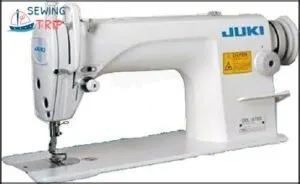
When precision meets power, the Juki industrial straight stitch sewing machine takes the spotlight.
It’s built for speed and strength, making it your go-to for stitching heavy-duty materials like denim or canvas.
The 5500 stitches per minute and a max 5mm stitch length make production a breeze, while the industrial clutch motor guarantees reliable performance.
Just a heads up—assembly can be tricky, and instructions might be missing, so hit up some online videos.
For pros or serious creators, it’s a game-changer!
Best For: Professional seamstresses and small businesses needing a high-speed, heavy-duty sewing machine for precise and consistent stitching on various materials.
- High-speed operation of 5500 stitches per minute improves efficiency.
- Handles tough materials like denim and canvas with ease.
- Durable industrial clutch motor ensures reliable long-term performance.
- Assembly can be challenging, with instructions often missing.
- Customer service from some sellers may be unreliable.
- Machine and table may arrive separately, adding to setup time.
2. Juki sewing and quilting machine
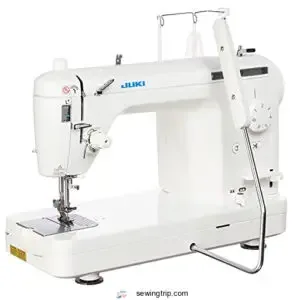
If you’ve ever wrestled with quilting thick fabrics, the Juki sewing and quilting machine feels like the hero you didn’t know you needed.
This workhorse runs at 1,500 stitches per minute, handling dense layers like a pro.
With features like an automatic needle threader and adjustable pressure foot, it’s built for speed and convenience.
The aluminum die-cast body minimizes vibration, keeping your stitches steady.
While there’s a slight learning curve, YouTube tutorials make setup a breeze.
It’s reliable and worth every penny.
Best For: Quilters and sewing enthusiasts looking for a heavy-duty, high-speed machine that excels at quilting, handling thick fabrics, and delivering professional-quality results.
- High sewing speed of 1,500 stitches per minute for efficient work.
- Sturdy aluminum die-cast body reduces vibration for precise stitching.
- Automatic needle threader and adjustable pressure foot for added convenience.
- Slight learning curve, especially for beginners.
- Requires regular oiling to ensure smooth operation.
- Not suitable for those seeking decorative or embroidery stitch options.
3. Janome 1600P QC High Speed Quilting Machine
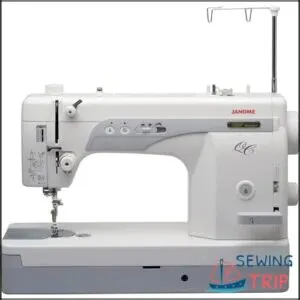
Why settle for slow when the Janome 1600P QC delivers up to 1,600 stitches per minute?
It’s a powerhouse built for advanced quilters or small businesses tackling heavy-duty projects, with straight-stitch precision and a sturdy aluminum build making it ideal for piecing, quilting, or garment assembly.
The separate bobbin winder is a multitasker’s dream, while the automatic thread cutter saves precious time.
Keep space in mind—it’s big, though loud at high speeds, its performance easily outweighs the hum, being truly semi-industrial at heart.
Best For: Experienced quilters or small businesses needing a fast, semi-industrial machine for precise straight-stitch tasks like quilting or garment assembly.
- High-speed motor with up to 1,600 stitches per minute for quick project completion.
- Durable aluminum construction minimizes vibration and ensures longevity.
- Separate bobbin winder and automatic thread cutter save time and improve efficiency.
- Straight stitch only limits versatility for decorative or zigzag needs.
- Noisy at high speeds, which may not suit shared or quiet spaces.
- Advanced functions can be challenging for beginners to navigate.
4. Juki industrial sewing machine servo
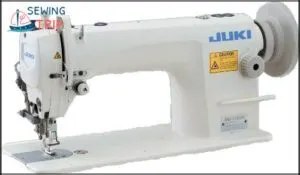
The Juki industrial sewing machine with a servo motor isn’t just another workhorse—it’s the quiet powerhouse your projects deserve.
Designed for tackling medium-weight fabrics, it pairs top-and-bottom feed technology with adjustable speed control, making even tricky layers manageable.
The servo motor keeps things energy-efficient and smooth, so you’ll sew more without stressing your ears—or your wallet.
Ideal for bag-making or upholstery, this machine’s only hiccup might be its learning curve, but once mastered, it’s a total game-changer for industrial-grade tasks.
Best For: Professionals or enthusiasts working with medium to heavy materials like leather, denim, or upholstery, especially for projects like bag-making or furniture repair.
- Quiet and energy-efficient servo motor saves on power and reduces noise.
- Top-and-bottom feed system makes sewing layered or thick fabrics manageable.
- Includes all necessary components such as a stand, table, and sewing light for easy setup.
- Has a learning curve for new users, especially without a written manual.
- Minor blemishes or scratches on the table and legs may occur.
- No automatic thread cutter, which some users find inconvenient.
5. Juki Industrial Overlock Sewing Machine
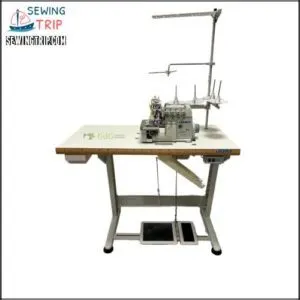
If you’re tackling tricky edges or stretchy fabrics, the Juki Industrial Overlock Sewing Machine might just be your best friend.
It’s built for smooth, professional finishes—think clean seam edges and beautiful overlocking.
This machine thrives on versatility, handling everything from lightweight knits to heavier materials effortlessly.
For further research, explore the best Juki sewing machine options available.
With low noise, durability, and user-friendly adjustments like stitch width and differential feed, it’s ideal for semi-industrial workflows.
Sure, assembly can be a headache, but once it’s set up, it’s a game-changer for garment production.
Best For: Small businesses or advanced home users needing professional-grade seam finishes and versatility in handling various fabric types.
- Delivers smooth, clean seams on lightweight to heavy materials with precision.
- Durable and low noise, designed for long-term semi-industrial use.
- User-friendly adjustments for stitch width and tension for flexible workflows.
- Assembly can be difficult and instructions are often unclear or missing.
- Some users reported receiving missing or damaged parts, requiring additional support.
- Professional setup or pre-assembled table options involve extra costs.
6. Juki portable sewing machine for quilting
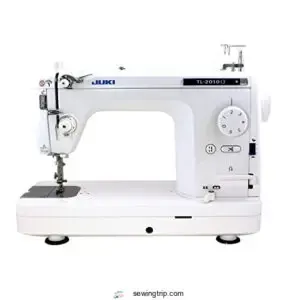
Why stress over quilting machines that can’t handle your favorite projects?
The Juki portable sewing machine for quilting combines speed and precision, working up to 1,500 stitches per minute.
With adjustable presser foot pressure and an advanced feed mechanism, it tackles thick layers like a pro.
The knee lever keeps your hands free, while the automatic thread cutter speeds things up.
Lightweight and easy to transport, it’s ideal for small spaces.
Quilters love its reliability, though regular cleaning keeps it running smoothly!
Best For: Quilting enthusiasts and sewists who need a portable, high-speed machine for professional-quality straight stitching.
- Handles thick fabrics and multiple layers with ease.
- Includes features like automatic thread trimming and a knee lever for convenience.
- Portable and lightweight design for easy transport.
- Needle threader can be frustrating to use.
- Requires regular maintenance, including cleaning and oiling.
- Lacks decorative stitch options for more creative projects.
7. Juki computerized sewing machine model
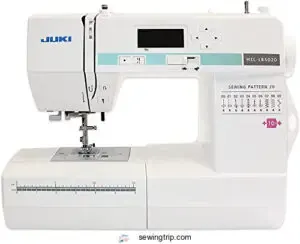
Looking for a machine that pulls its weight in both creativity and precision?
The Juki computerized sewing machine model has your back.
With 20 stitch patterns, an LCD screen, and speed control, it blends efficiency with ease of use.
Tackle quilting, heavy fabrics, or intricate details thanks to its drop-feed system and programmable needle positions.
Gadgets like the applique foot, zipper foot, and a bright LED light make projects smoother.
Compact yet powerful, it’s a perfect choice for quilting enthusiasts or small business setups.
Best For: Intermediate to advanced sewists and small business owners who need a reliable, compact sewing machine capable of handling diverse fabrics and quilting projects.
- Handles thick fabrics and quilting with ease.
- Compact design perfect for limited spaces.
- User-friendly with automatic threading and speed control.
- LED light could be brighter for detailed work.
- Pricier than basic home sewing machines.
- Accessory arm can be challenging to utilize.
8. Industrial Grade Serger Sewing Machine
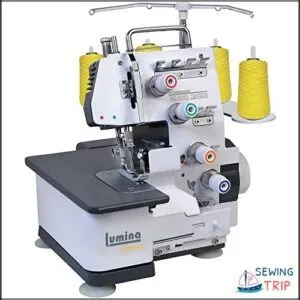
An industrial-grade serger sewing machine like the Lumina Sienna changes the game for your sewing projects.
It handles heavy-duty overlocking with its powerful motor and precision cutting system, ensuring clean, professional edges.
You’ll love the color-coded threading—simplifying setup—even if you’re new.
With 1,250 stitches per minute, it’s a time-saver built for efficiency.
Don’t forget its sturdy metal frame, preventing shaking during intense use.
Whether you’re finishing seams or sewing decorative edges, this machine delivers results that make you look like a pro.
Best For: Small business owners, professional sewers, and hobbyists who need a reliable, durable serger for heavy-duty projects and fast, professional results.
- High-speed performance with 1,250 stitches per minute for efficiency.
- Durable metal frame reduces vibration and ensures long-term use.
- Color-coded threading simplifies setup, even for beginners.
- Requires high-quality polyester thread for optimal performance.
- Some users find threading and stitch width adjustments challenging.
- Customer support response times can be inconsistent.
9. Heavy Duty Industrial Sewing Machine
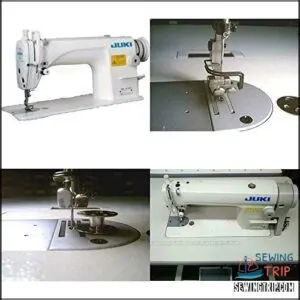
When you’re sewing heavy fabrics like denim or canvas, a heavy-duty industrial sewing machine is your powerhouse.
Think high-speed stitching, incredible strength, and durability built to last.
With models like the Juki DDL-8700 or Janome HD3000, you’re getting precision, reliability, and the ability to handle multiple fabric layers effortlessly.
These machines thrive in workshops, letting you power through demanding projects without breaking a sweat.
It’s the ultimate upgrade for pros serious about performance and stitching quality.
Don’t just sew—own your craft!
Best For: Professionals and serious hobbyists who need a reliable sewing machine for heavy-duty fabrics like canvas, denim, and leather.
- Handles multiple layers of thick material with ease.
- High-speed stitching up to 5500 stitches per minute.
- Durable industrial build for long-term use.
- Heavy and challenging to relocate.
- Assembly can be tricky, with reports of missing or damaged parts.
- Comes with limited versatility, focusing on straight stitching only.
Semi Industrial Machine Maintenance
Keeping your semi-industrial sewing machine in top condition requires regular cleaning, proper oiling, and attention to detail.
By tackling maintenance issues early, you’ll guarantee consistent performance and extend the lifespan of your machine.
Regular Cleaning and Oiling
Keeping your semi industrial sewing machine humming requires consistent care.
Dust and lint are stitching’s sneaky enemies, so grab a brush or vacuum to tackle them regularly.
Don’t skip machine lubrication—use the right oil types for smooth motion.
Stick to a solid maintenance schedule to avoid surprises.
- Cleaning tools: Soft brushes, tiny vacuums.
- Oil matters: Only sewing-safe oils.
- Routine checks: Weekly inspections.
Troubleshooting Common Issues
Issues with your semi industrial sewing machine? Start by fault finding: check for loose power connections or lint buildup.
Thread snapping? Inspect tension settings and clean the thread path. Skipped stitches often mean a dull needle—replace it!
For uneven seams, adjust feed dogs or stitch length. With proper error diagnosis, you’ll master machine repair like a pro!
Accessories for Optimal Performance
You’ve handled troubleshooting, but the right sewing machine accessories can make all the difference.
Keep sewing needles sharp and use thread types suited to your fabric.
Swap presser feet to handle different techniques.
Oil filters keep your machine smooth, while bobbin cases prevent tangles.
Add extension tables or sergers for bigger projects, and those solid sewing machine tables? They’re game-changing!
Factors to Consider When Buying
When you’re buying a semi-industrial sewing machine, focus on durability, motor power, and workspace needs to verify it matches your projects.
A sturdy frame, high-speed motor, and ample sewing area can make all the difference for handling thicker fabrics and longer hours of use.
Durability and Build Quality
A sturdy metal frame is the backbone of a reliable semi industrial sewing machine.
Build quality and durability determine how well it withstands material resistance and wear testing over time.
Machines with heavy-duty, high-quality components deliver consistent stitch quality, even on rugged fabrics.
Look for models designed to handle tough tasks without faltering—your projects deserve that long-term reliability.
Motor Power and Speed
Motor power and speed are game-changers when selecting a semi industrial sewing machine.
High motor efficiency guarantees consistent sewing velocity, tackling thick fabrics without hesitation, and adjustable speed control lets you handle delicate patterns or heavy-duty sewing with ease.
Torque management is key for precision, especially in heavy duty sewing machines.
Power output defines reliability—don’t overlook it when exploring sewing machine reviews, considering factors like motor power and high motor efficiency.
Workspace Requirements
Your workspace needs thoughtful planning to keep things running smoothly. A sewing machine for heavy use thrives in an efficient setting.
- Room Layout: Make certain there’s enough space for fabric and movement.
- Storage Solutions: Keep tools within reach.
- Lighting Needs: Bright lights minimize mistakes.
- Ergonomic Setup: Prioritize comfort for long sessions.
- Noise Reduction: Consider sound levels for shared spaces.
Semi Industrial Vs Industrial Machines
When choosing between semi-industrial and industrial sewing machines, it’s essential to understand their differences in performance, durability, and design.
Semi-industrial machines work well for lighter tasks, while industrial models excel at heavy-duty projects and prolonged use.
Key Differences and Similarities
If you thought budget was your only worry, think again—the differences between semi industrial sewing machines and industrial ones are just as important.
While the amount of noise, speed controls, and portability are clear separators, both tackle heavy fabrics like pros and deliver consistent stitch quality.
Here’s a handy table for quick comparisons:
| Feature | Semi Industrial Machines | Industrial Machines |
|---|---|---|
| Motor Power & Speed | Moderate | High |
| Stitch Capabilities | Versatile, zigzag available | Straight focus |
| Noise Levels | Lower | Louder (for factories) |
Choosing The Right Type for Your Needs
Choosing between semi industrial sewing machines and industrial sewing options comes down to what you’re making and how often.
If you’re sewing heavy-duty fabrics like leather or producing in bulk, industrial models shine.
But for lighter projects or compact spaces, semi industrial sewing offers ample power without overkill.
This quick comparison outlines key factors:
| Sewing Machine Types | Fabric Selection | User Experience |
|---|---|---|
| Semi Industrial Machines | Medium-weight fabrics | Easy setup, quieter |
| Industrial Machines | Heavy-duty materials | Long hours, robust |
| Stitch Quality | Consistent, finer work | Tough seams, durability |
| Machine Durability | Moderate | Built for longevity |
| Cost | Affordable | Higher upfront cost |
The key differences between these options lie in their application, with semi industrial machines suitable for medium-weight fabrics and industrial machines better for heavy-duty materials, impacting the overall user experience and machine durability.
Sewing Machine Brands and Models
When choosing a semi-industrial sewing machine, understanding the strengths of brands like Juki, Janome, Consew, and Reliable is essential.
Each brand offers unique features and models, suited for different sewing needs and levels of expertise, which is a key factor to consider with Juki being one of them.
Juki and Janome Comparison
When comparing Juki and Janome semi industrial sewing machines, it’s like choosing between speed and user-friendliness.
A sewing machine comparison chart can help you decide which brand best suits your needs.
Juki brings unmatched sewing speed and fabric handling, with options like the Juki DDL-8700 excelling in Machine Durability.
Janome, favored for its simplicity and User Interface, shines in models like the Janome 1600P-QC, offering Stitch Quality while balancing power for versatile semiindustrial sewing needs.
Consew and Reliable Options
Consew models, like the P1206RB, excel in semi industrial sewing with their durable builds and multiple foot options—perfect for upholstery or leather.
Reliable motors shine in machines like the Barracuda 200ZW, offering impressive sewing speed for tight spaces.
Both brands deliver exceptional machine durability and performance, making them solid picks for anyone exploring semiindustrial sewing machines in 2025’s industrial sewing machine reviews.
When searching for heavy-duty sewing machine parts, the quality and compatibility of the components must be evaluated for the best results.
This will guarantee the highest level of performance and machine longevity, and verify the components will function as intended, leading to superior overall machine operation.
Highlead and TechSew Alternatives
Switching gears from Consew, let’s spotlight Highlead and TechSew, two standout brands in semi-industrial sewing machines.
These alternatives pack a punch in reliability and precision, offering robust options for industrial stitching without breaking the bank.
Here’s what makes them shine:
- Highlead Models: Known for durability and smooth operation.
- TechSew Reviews: Consistently praised for leatherwork.
- Alternative Brands: Combine innovation with affordability.
- Sewing Machine Comparison: Top-rated for versatility.
For those interested in purchasing or learning more about these machines, checking the sewing machine products can provide valuable insights.
Buying Guide and Recommendations
Choosing the right semi-industrial sewing machine doesn’t have to feel overwhelming if you know what factors to prioritize.
By focusing on your budget, materials, and intended use, you’ll find a machine that fits your needs perfectly.
Research and Comparison Tips
If you’ve been browsing sewing equipment reviews, you’ve likely realized sewing machine comparisons require some strategy.
Take note of stitch quality across different models during sewing machine tests—user videos are gold for spotting flaws.
For semi commercial sewing, check fabric selection to verify compatibility.
Compare speed controls and maintenance costs for long-term value.
When evaluating machines, consider consulting a sewing machine comparison to make an informed decision.
| Feature | Model A | Model B |
|---|---|---|
| Stitch Quality | Consistent on denim | Slight puckering |
| Speed Controls | Adjustable, smooth | Limited settings |
| Maintenance Costs | Low for replacement | Higher upkeep fees |
Considering Budget and Material
When tackling Fabric Costs and Material Selection, your budget planning should leave room for quality.
Avoid blowing your funds on a semi commercial sewing machine if Sewing Expenses already stretch thin.
Balance cost efficiency—invest in a durable model over cheap fixes.
For instance, semi-industrial machines rated highly in sewing equipment ratings can handle heavy-duty tasks.
Check heavy duty sewing reviews or a sewing machine guide to match your needs without overspending on unnecessary features.
Understanding Sewing Machine Reviews is essential for making an informed decision on the best semi-industrial sewing machine for your specific needs.
Frequently Asked Questions (FAQs)
What are the best industrial sewing machines in 2024?
Who knew sewing could feel like conquering a marathon?
Top picks for 2024 include the Juki DDL-8100, Janome HD3000, and Consew 206RB-
They’re reliable, fast, and built to tackle heavy-duty projects effortlessly.
Is a sewing machine a semi-industrial machine?
A sewing machine becomes semi-industrial when it’s built tougher than home models but doesn’t match full industrial machines’ power.
Think of it as the middle ground—handling tougher jobs without needing a factory-style setup.
What makes a good semi professional sewing machine?
A good semi-professional sewing machine handles thick fabrics, offers reliable speed, and includes versatile stitch options.
Look for adjustable tension, user-friendly features, and durability.
Bonus if it’s portable and comes with handy accessories!
What is the best industrial sewing machine?
In the context of industrial sewing machines, the Juki DDL-8700 takes the cake.
It’s built for speed, handles tough materials effortlessly, and guarantees flawless stitching—perfect for pros who demand reliability and quality every time.
Are industrial sewing machines good for beginners?
Sure, industrial sewing machines are great for beginners if you’re tackling heavy-duty projects straight away.
They’re powerful, reliable, and built to last, though mastering their speed might take a little practice!
What brand is best for an industrial sewing machine?
You can’t go wrong with trusted brands like Juki, Consew, and Janome.
They’ve nailed durability and precision, offering machines that thrive under pressure.
Each has models suited for heavy-duty projects, ensuring you’re always covered.
What is the difference between industrial and semi industrial sewing machines?
Think of semi-industrial machines as the middle sibling—tougher than home models but not as powerhouse-heavy as industrial ones.
They’re perfect for medium tasks, quieter, cheaper, but lack the nonstop durability industrial machines boast.
Which is better, Jack or Juki?
It depends on your needs.
Jack machines are budget-friendly and user-friendly, perfect for lighter work.
Juki offers durability and precision, excelling at heavy-duty tasks.
Think long-term use and project type to decide.
Which sewing machine has the least problems?
A sewing machine is like a dance partner—you want one that glides smoothly.
Juki DDL-8700 often tops the charts for reliability with minimal breakdowns, offering consistent performance for both pros and everyday stitchers.
How to find parts for rare models?
Finding parts for rare sewing machine models takes patience.
Check specialized online stores, join sewing forums, or contact vintage machine experts.
Sometimes, repair shops hoard hidden treasures.
eBay or Etsy can be goldmines for rare parts too!
Conclusion
Choosing a semi-industrial sewing machine is like finding the perfect tool for a job—it bridges the gap between home convenience and industrial strength.
Whether you’re tackling thick leather or whipping through high-speed quilting, models like the Juki and Janome offer reliability and power.
With features like sturdy motors and smooth stitch quality, these machines cater to demanding projects without overwhelming your space.
Explore our semi-industrial sewing machine reviews to find a machine that matches your goals and creativity.
- https://www.gathered.how/sewing-and-quilting/sewing/best-industrial-sewing-machines
- https://www.maryjanesandgaloshes.com/best-industrial-sewing-machine/
- https://www.reddit.com/r/sewing/comments/155yp37/semiindustrialprofessional_machines_for_garment/
- https://sewing.patternreview.com/SewingDiscussions/topic/114528
- https://www.thecreativecurator.com/best-professional-sewing-machines/

